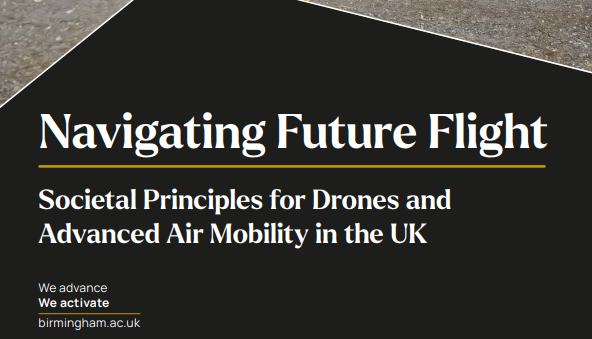Resource
Share this content
The University of Birmingham/UKRI: Future Flight Survey 2024
This report presents analysis of data from the Future Flight Survey 2024. With a sample of over 3,000 adults aged 18+ living in the UK, it explores public awareness, perceptions, and expectations of emerging Future Flight technologies in the UK.
PLEASE NOTE: A five page technical report with further details about the study’s methodological approach and sampling method is also available here.
Executive Summary
Current levels of awareness of the future flight technologies measured in this survey is mixed. While the vast majority of the UK public have heard of non-passenger carrying drones, far fewer have heard of advanced air mobility (eVTOLs) or electric/hydrogen regional air mobility.
Whilst overall there is a sense that the benefits of future flight technologies outweigh the drawbacks, the research highlights the nuances of this perception, with the public recognising a number of different pros and cons. The main perceived benefits relate to providing support to emergency services, access to isolated areas/communities, reducing fossil fuel usage and creating new jobs. The top cited drawbacks focus on cyber security, their impact on wildlife, safety concerns, congestion in the sky, privacy and that they may only be accessible to the most wealthy in society. A geographical split in terms of perceived uses of these technologies is apparent; for both drones and eVTOLs, respondents are generally more likely to perceive them to be beneficial in remote and rural areas compared to urban and suburban ones.
When it comes to the development of future flight technologies specifically, people view these as among the lowest priorities for investment in relation to other forms of sustainable transport, favouring on ground transport. Regional electric or hydrogen flight across UK or in rural/remote areas were seen as higher priority than electric flight in urban areas. The UK public also hold mixed views on the role of future flight technologies in tackling climate change. While a majority agree that in practice new technologies don’t help to tackle climate change and that they mostly help make companies money, a majority also agree that new technological developments will be fundamental to tackling the climate crisis.
There is strong support for greater levels of government involvement in the technology and transport sectors, as well as on climate change. Large majorities support greater government involvement in the transport system, with most saying that the government should regulate private companies to ensure they take action on climate change, and that it is the role of the government to ensure that the benefits of new technologies benefit everyone. However, people generally report low levels of trust in both local and national government to accurately explain and mitigate the impacts of technology on society, as well as to ensure that future flight technologies are safe. Generally, there is greater trust in local government, however there is greater trust in national government for making decisions that would ensure future flight operations are rolled out in a way that best meets the interests of people living in the UK. These low levels of trust in government could be bypassed by an independent body (acting as a link between government, industry and the UK public which has the public’s support).
When it comes to future adoption of future flight technologies, people anticipate non-passenger carrying drones becoming a widespread technology in the UK in ten years’ time, though the proportions saying this about eVTOLs are somewhat lower. A majority do however say they would feel comfortable being a passenger in an eVTOL once introduced, though only after they had been operating for a number of years. While women are less comfortable with a variety of aspects of future flight technology development, the finding that people would feel more comfortable riding in an eVTOL after they have been in use for a period of time holds regardless of gender.


